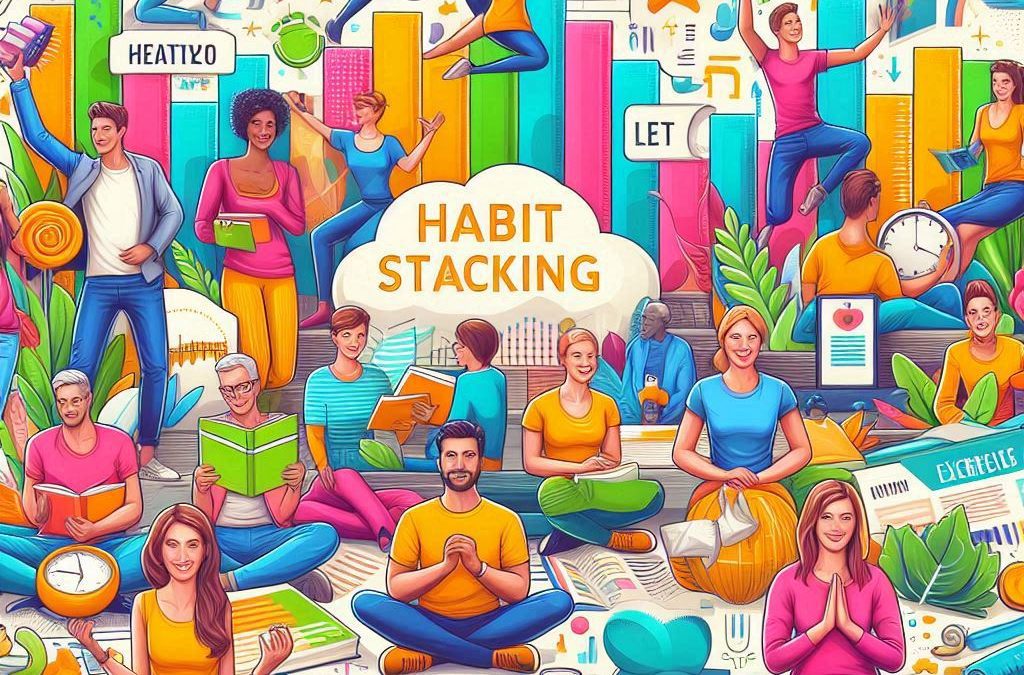Habits are the building blocks of our lives, but creating and sticking to them can be uniquely challenging for neurodivergent individuals. Our brains often thrive on novelty, struggle with executive functioning, rebel against rigid routines or even getting stuck in routines or hyper focus. Enter habit stacking—a game-changer for building sustainable habits, no matter how your brain is wired.
What Is Habit Stacking?
Coined by productivity expert James Clear in his book Atomic Habits, habit stacking is a technique that pairs a new habit with an existing one. The idea is simple: you “stack” the new behaviour on top of something you’re already doing, making it easier to remember and integrate into your daily life.
For example:
Existing habit: Writing an article (usually something you find boring).
New habit: Start said article and setting a timer that suits you, e.g. 1 hour.
Stacked habit: A cuppa and some music you love.
Why Habit Stacking Works for Neurodivergents
For neurodivergent individuals—including those with ADHD, autism, or other unique neurotypes—habit formation often requires creativity and adaptability to create momentum and predictability. Habit stacking aligns perfectly with these needs because many neurodivergent people have an interest based nervous system, meaning, it’s really difficult to do task that are not of interest and don’t offer a dopamine hit
This is why finding out the things that you love to do to use as the stacked habit helps and acts as a rewarded outcome to work with how you work.
Some ideas of stacked habits you can include maybe;
- Music
- Going for a walk
- Having a cup of tea
5 benefits of learning how to integrate habit stacking into your personal and work life;
- Reduces Overwhelm: By tying new habits to existing ones, it minimizes the mental effort required to start a new routine, which is especially helpful for those who experience executive functioning challenges.
- Boosts Memory: Habit stacking creates a natural trigger system with practise, making it easier to remember tasks without relying on external reminders.
- Customizable and Flexible: It can be adapted to fit individual energy levels, sensory preferences, and daily rhythms, making it inclusive for diverse needs.
- Builds Momentum: Small, achievable wins from stacking habits help build confidence and motivation to tackle larger goals over time.
- Supports Autonomy: This approach empowers neurodivergent individuals to create structures that work uniquely for them, fostering a sense of control and self-reliance.
How to Build a Habit Stack as a Neurodivergent Individual
Here’s a step-by-step guide to crafting habit stacks that work with your unique brain:
- Start Small: Choose micro-habits that feel manageable—like writing one sentence in your journal instead of a full entry.
- Anchor to Existing Routines: Look for habits you already do consistently, like brushing your teeth, checking your phone, or making lunch.
- Visual Reminders: Use sticky notes, phone alerts, or visual cues to reinforce your stack until it becomes second nature.
- Adjust for Energy Levels: If mornings are tough, stack habits later in the day when you naturally have more energy.
- Reward Yourself: Celebrate each small success with something you love—a favourite snack, music, or simply a moment of pride.
Examples of Habit Stacking
Here are some practical examples tailored to common neurodivergent challenges:
- Challenge: Forgetting to hydrate.
- Stack: Drink a glass of water right after brushing your teeth.
- Challenge: Managing sensory overwhelm.
- Stack: Pop some loop earplugs in or preferred earplugs/noise cancelling headphones while starting your work or study session.
- Challenge: Medication adherence.
- Stack: Take your meds immediately after turning off your morning alarm.
Final Thoughts: Progress, Not Perfection
Habit stacking isn’t about perfection—it’s about building on what is already there and to work WITH your brain to support yourself, ONE step at a time. For neurodivergents, this method offers a compassionate and practical approach to creating habits that stick, without the guilt or pressure to conform to neurotypical routines.
Remember, every small success adds up. Be kind to yourself, experiment with your stacks, and celebrate your unique brain for all its strengths and eventually, it’ll become second nature to you.
Amanda Bowden ©️2025

